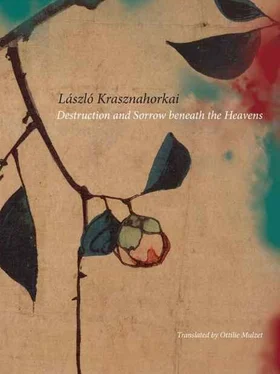yang. For me, this is an easy question. You love others, you must love other people. You must represent love and friendship. You must express compassion with those who suffer. That is enough. You must do what you can. You must help everyone you can with the best part of your being. Show compassion for them, and that is enough. There is a horrific amount of suffering in the world, you must try to help those who suffer, but you cannot do everything .
But he, Stein, is not able to feel compassion for the depraved and the hardened.
yang. Of course. You must hate them. You must love those who suffer, but you must hate those who are evil. I too hate certain people, but I cannot do anything against them. They could easily kill me. But I couldn’t kill them. I have no power for that. And I don’t even want it.
Mr Yang is quiet. Stein suddenly realizes how tired he is and he realizes that if he is tired, how exhausted this old man, almost 70 years old, must be. He has to leave, and he thinks for a long time about what Mr Yang said. After a long silence, he finally speaks again.
Mr Yang, he says, never has he found it so difficult to end a conversation. But he has looked at the clock, and he has looked at the face of Mr Yang, and he sees that he is tired. Surely now he would like to go to sleep, and Stein is detaining him. It is night-time already. Please don’t be angry, Stein says, that he has stayed for so long, and has not let him rest.
yang. Nonsense! I never sleep at night. Only in the morning, before noon. I sleep seven times a week, but always just a little bit. But not at night. Never.
I never sleep at night : the words of Mr Yang echo in Stein’s mind, and he cannot move, he does not get up, he does not start off, it is, however, already time, and maybe even necessary that he get up to catch the last train back to Beijing, and it could already be night-time — it’s just that he is incapable of movement, unable to get up and set off, because he just keeps listening to Yang Qinghua who begins to speak again, he just listens as he speaks, he just looks at his grey hair, his noble features, he just marvels at this mandarin on the housing estate in Tianjin, as he just keeps speaking, in his own extraordinarily precise English he just keeps pronouncing and pronouncing his sentences, the most simple sentences in the world, and outside, it is already late at night — very late at night.
A Dream in the Courtyard of the Guangji Si[177]
By now he is really tired and he has nowhere to go. He no longer wants to see any temples, any museums, or any exhibits. He wanders like a lost man around Beijing. He can’t stay home, nor can he sit forever next to Mama’s bed. So every day he comes out of the house, and he walks along the same streets, and he ends up in the same place: in the Guangji Si, a forgotten, abandoned Buddhist monastery situated amid a few remaining buildings — because no one is ever there, not a soul, just as there was no one here yesterday, neither monk, nor pilgrim, really, no one comes here. He finds his place, the place where he was yesterday, the day before yesterday as well, he goes to one of the inner courtyards at the back of the little temple, and there he sits down on the same step of the ruined pavilion, and he doesn’t do anything, he doesn’t think — nothing.
It’s afternoon, or twilight is already beginning to descend, the weak sunlight falls flatly. It warms him a little, and in that warmth he falls into a deep sleep.
Then suddenly he wakes up. Tang Xiaodu is sitting next to him. Stein is really surprised; he doesn’t understand how he could have ended up here. How could he have known that he comes here? For while he does not speak, he lights a cigarette, then slowly blows out the smoke. He doesn’t look sad but tired, like Stein. Before he could ask how he was able to find him, Stein begins to describe his situation. That he is no longer curious, he doesn’t want to see anything, he doesn’t want to talk to anyone, and that he was always comes here, into this protection; and then he confesses that he is in despair because he cannot find what he was searching for, and it now seems to him that he never will find it because it no longer exists, or nothing remains of it; and that, moreover, he believes he has only himself to thank for all this despair, because no one ever forced him to believe that what he was looking for was still here, anyone whose word he might have trusted never made any such claim; so that in all likelihood the whole thing was his concoction: he made up the idea that it still existed somewhere, and it was he who began to search, and of course he didn’t find anything at all, just a few sad people and a few sad places, and already this stream of words is beginning to gush forth; Xiaodu listens, he nods silently, and Stein just keeps on talking: he was here in 1998 as well, when he came in search of the entirety of classical China, and although he kept telling people that his quest was for Li Taibai, well, of course then too it was the idea of Chinese classical culture that was in his head, and you know, Stein tells him, that journey was still a happy one, he didn’t find anything back then either; still, in the end, there was something, and he formulated it like this: that the sky that clouded above him was the same sky that clouded above Li Taibai and all of Chinese classical poetry, and all of Chinese tradition, and this filled him with happiness just to know that it was the same sky; only now he feels so uncertain, so that he will place his trust in in his dear friend Xiaodu, may he be the one to tell Stein now: Are the heavens here above them still the same?
Tang Xiaodu does not reply for a long time.
No, these are not the same heavens, he answers very softly, all the while not looking at Stein. Here below, on the earth, everything has changed. There is no more Buddhism, no more Taoism, there are no monasteries, no painting and no music, no poetry and no tradition — everything here below has changed, so how could the heavens above us be the same?
He rises, takes a few steps back and forth, then walks around the entire courtyard, stopping here and there where there are still patches of sunlight; he stands, warming himself in the sun’s rays, and Stein watches him, and he feels that in a moment he will fall asleep in this peaceful silence, here in the innermost courtyard of the Guangji Si.
But he doesn’t.
He wakes up.
And there is no one beside him.
The sun has set.
The air is chilly now.
The courtyard is empty.
In Suzhou, Not at All in Suzhou
The Road That Leads There, 1
Go to Suzhou, Tang Xiaodu says one day, and this is so surprising from him, as he always helps with everything but never directly intervenes in Stein’s plans, he just supports him, and with his solicitude creates the opportunity for what he, Stein, wants, to come about as optimally as possible within the given circumstances, but for Tang Xiaodu to call upon him to do something specific is so unlike him that Stein asks, very cautiously, if he has understood correctly? He should go to Suzhou? To the queen of gardens? To the city of the most beautiful gardens in the world? Yes, Tang Xiaodu nods seriously — there, where the Zhouzheng Yuan,[178] the Shizi Lin,[179] the Liu Yuan,[180] the Yi Yuan,[181] the Canglang Ting[182] and, above all, the Wangshi Yuan[183] are? — Yes, there, says Tang Xiaodu — but, asks Stein, he should go to this world-famous location, this tourist paradise to the south of the Yangtze? He should go to the very citadel of the Chinese tourist industry? Yes, his gentle friend from Beijing answers, as seriously as he can, and this is so unexpected, and he provides no explanation as to why Stein should go to Suzhou when he has already travelled around that region fairly thoroughly — so that from this point on Stein asks him no more questions, he just packs his bags, and already he is sitting on the train, and already he has arrived one morning at around ten o’clock, and of course he is walking with the interpreter out from the station and towards Suzhou, and since it is not just at any old place that they have arrived, they almost don’t need a map, there are signposts almost everywhere, at least for the most famous sites, so that at first they don’t use anything to help guide them along but follow their noses, follow the tourist signs: the first one is next to the Beisi Ta,[184] the monumental structure of the pagoda of the Northern Temple, and immediately they are at the most famous site, the Zhuozheng Garden, and the crowd is horrific, horrific with its unrestrained groups of tourists, the live loudspeakers, ignominious to the enormity of Japanese tradition so relevant to this place, horrific to keep bumping into the so-called tour guides, so that they just remark as much as they can — walking along the winding, labyrinth-like paths situated among the enchantingly airy pavilions and courtyards — that the Zhuozheng Yuan is truly astounding —they are already going across into the nearby Shizi Lin, into the Lion Garden, where fate determines that they can wedge themselves into the breach between two attacking crowds of tourists, and so they are able to give themselves fully over to wonder, because, despite the difficult circumstances, the largest garden in Suzhou nearly strikes them dumb: they are, this time, in one of the authentic places of the art of the Chinese garden, and here — if they perceive anything at all — in the Lion Garden they are forced to state that the beauty with which the weave of its fabric has been spun is simply amazing, despite the extreme quantity of the extreme rocks of the Tai Lake, because these gardens, in their eyes, seem too crammed full of all these innumerable stone structures, in accordance with the unique use of stone in Chinese gardens, the masses of huge unique stone formations here or there — pock-marked, morbid, really extreme in form — in Zhuozheng as well, but this, the Lion Garden, is enchantingly beautiful — so that afterward, going directly by bus to the southern part of the city, and ending up in the famously hard-to-find Wangshi Yuan, the tiny garden of the Master of the Nets, they give themselves over once and for all because, following the given directions, it is very hard to find — they have to stumble along alleyways promising nothing, and simply believe that, amid the scaffolding and mortar trowels of witheringly banal, ugly little houses, unfriendly gazes and old, crumbling plaster walls, they are on the right path; they are, however, on the right path, and they do find it, and what they find sweeps away their doubts as to whether something original can remain in an area flooded by tourists; much more has happened by the time they have arrived, namely, that they perceive that the Suzhou Garden exists, and that the classical beauties of this stratum have remained, in their essence, undisturbed — if someone steps into the spaces of the Zhuozheng, the Shizi Lin or the Wangshi Yuan, then he has stepped into the lost traditions of China; Stein does not understand how this can be possible, but this is how it is, clearly the tourism experts have been here as well, huge crowds of them, they too have been here, they have set up the ticket offices, they have created the routes for the luxury buses, they have built parking lots for the buses, in a word, they have put the Suzhou gardens on the list in order to let in endless series of tourists, but. . nothing has been ruined here, it seems almost impossible but that’s how it is, the gardens are intact, and they are so surprised by this, and so enthralled, that it is only now, towards the end of the day, that they notice that they haven’t spoken a word to each other, they travel along the Renmin Lu, from then on it is their Main Street, going back towards the north, so that they may conclude the day in the Yi Yuan, a day in which the sun has been scorching them, and now is beginning to lose some of its strength, by the time they reach the Yi Yuan it only illuminates and warms, they pay the entrance fee, it is already late, almost closing time, someone at the ticket window tells them, but they interpret it like this: that the Yi Yuan seems almost desolate, and in the obliquely following light, in the pleasant elderly warmth, they stroll into undoubtedly the most affecting of the gardens they have seen in Suzhou on this amazing and mysterious day, they stroll along the silent paths into another immortal creation, into this tiny paradise where, although it is almost closing time, as they were told at the ticket window, it is as if someone had made time stop here, because they still somehow have enough time to stroll slowly around the pavilions, they can in a leisurely manner inspect the steles built into the walls, at the end they can even sit down by the lake in the garden, in front of a pavilion, and give themselves over to the tranquillity gathering over the garden, the beauty inexpressible in words, and, without even looking at their watches, they are able to contemplate the mystery of why they have been sent here and what exactly must be waiting for them now.
Читать дальше












